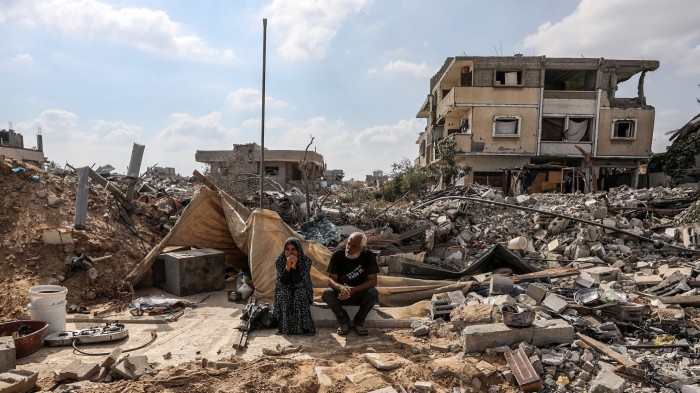When negotiators gather in Baku for the COP29 climate conference this week, they will be doing so against a backdrop of global conflict and stalled momentum on climate action. Wars in Gaza, Ukraine and Sudan have sapped diplomatic and public attention, hobbling multilateral co-operation at a time when it was already weak, while Donald Trump’s re-election as a pro-fossil fuel US president demonstrates how climate change is falling from governments’ and the public’s priority lists.
But largely lost amid the tendency to examine these challenges in isolation is an understanding of how intimately connected conflict and climate change are. Experts suggest that, if world leaders were to better grasp that nexus, then they would probably be more committed to reining in emissions.
Many of the countries most affected by conflict are also those that are most vulnerable to climate stresses. All of the conflict therefore comes with a weighty environmental cost. For example, the fallout from airlines’ avoidance of Russian and Ukrainian airspace, as a result of the Ukraine war, has added annual emissions equivalent to those of Kenya.
And that may be just a small foretaste of what’s to come. According to the UN, the world is facing the highest number of conflicts since the second world war. Yet record global warming risks aggravating existing clashes and fuelling new ones. “Things are difficult enough as it is,” says Amadou Sow, a community leader in a northern Senegalese community roiled by farmer-herder conflict. “Now, the conditions are waging war on us. How are we supposed to continue like this? How can we keep the peace?”
Most climate-related violence is playing out in ways that few officials meeting in Baku will be familiar with — but it comes with profound geopolitical ramifications. For example, in rural coastal Bangladesh, pirates are preying on villagers. Many of the victims are ex-farmers who have lost their lands to rising seas and feel they have few alternatives but to seek a living fishing in pirate-infested waters.
Pirate bands, whose numbers have surged in line with the richness of the pickings, have taken to kidnapping locals, even cutting off hostages’ fingers to focus slow-paying family members’ minds.
Thousands of villagers have fled to Dhaka, adding to the Bangladeshi capital’s swelling numbers and its own security challenges. “With all of these people coming from the countryside, you can lose control — this has happened before,” says Shakib Mohammed, a policeman in Dhaka’s Paikpara neighbourhood.
Violence is also playing out in better known conflict zones, but with a bigger climate component than is popularly understood. As with many extremist armed groups, including Boko Haram and Al-Shabab, Isis in Iraq profited from collapsing agricultural conditions in the country’s agricultural heartland. The jihadis enjoyed recruitment success in villages that lacked supplementary irrigation sources, such as wells, and had become extra dependent on rains that were no longer falling as reliably.
Crucially, the group cast climate and wider environmental woes as the result of a malevolent Iraqi state, rather than the logical consequence of a baking, mismanaged landscape. In some instances, recruiters claimed that empty irrigation canals were running dry because bureaucrats in Baghdad were redirecting the water.
As the world warms, inhospitable conditions risk aggravating insecurity in richer countries, too. Studies and ground research show that violence against women in Europe and North America often surges during or after extreme weather events, as happened after Hurricane Beryl in Texas in July.
The same goes for other kinds of crime. For example, as climate-induced drought intensifies around the Mediterranean, which produces almost all of the world’s olive oil, prices have soared, and with them incentives for gangs and opportunistic thieves, alike. Outside Athens early this year, among the olive groves that surround the airport, a man who gave his name only as Yiannis said: “Three times this year, I’ve been robbed . . . All my neighbours, too. They see the trees as money.”
Even extreme violence may be proliferating for reasons that include more extreme heat. In 2022, 278 out of the 324 mass shootings in the US happened between June and September, which, as with most other recent summers, was one of the hottest seasons on record.
Speaking in the run-up to COP29, the Azerbaijani hosts have insisted they are incorporating conflict considerations into negotiations. They have presented the event as a “COP of peace” and a “Truce COP”, a slogan that some human rights groups have branded as hypocritical given Baku’s recent war with Armenia, in which it was seen as the primary belligerent. There will be a “peace day”, and a “climate and peace” initiative at the conference.
But there are more concrete measures that could help to reduce climate’s contribution to violence, according to climate finance and peace-building practitioners. For example, conflict-affected countries desperately need climate adaptation funding.
“Failing to provide climate adaptation funding in conflict-affected countries is a lose-lose-lose proposition,” says Geoff Dabelko, a professor at Ohio University and a top climate security specialist. “Conflict undercuts the institutions necessary to effectively adapt to climate change, making their needs even greater. Failing to invest in climate adaptation is also failing to invest in peacemaking.”
Climate mitigation is crucial, too. Without it, up to 3bn people might soon be living outside of the climatic conditions that have historically served humanity so well. In those circumstances, conflict on an unprecedented scale appears a given.
The writer is author of ‘The Heat and the Fury: On the Frontlines of Climate Violence’
Read the full article here

